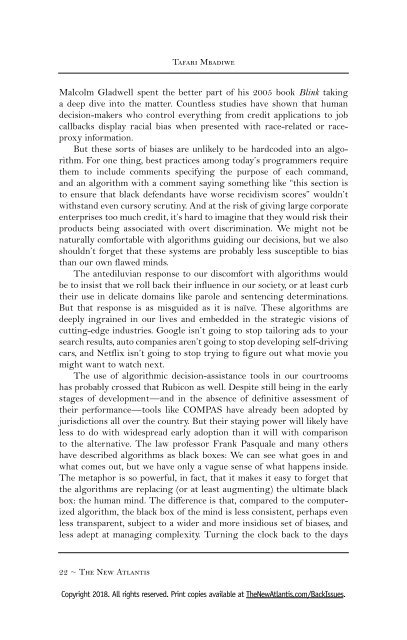The New Atlantis - Winter 2018 (Issue 54) uncompressed with cover
Create successful ePaper yourself
Turn your PDF publications into a flip-book with our unique Google optimized e-Paper software.
Tafari Mbadiwe<br />
Malcolm Gladwell spent the better part of his 2005 book Blink taking<br />
a deep dive into the matter. Countless studies have shown that human<br />
decision-makers who control everything from credit applications to job<br />
callbacks display racial bias when presented <strong>with</strong> race-related or raceproxy<br />
information.<br />
But these sorts of biases are unlikely to be hardcoded into an algorithm.<br />
For one thing, best practices among today’s programmers require<br />
them to include comments specifying the purpose of each command,<br />
and an algorithm <strong>with</strong> a comment saying something like “this section is<br />
to ensure that black defendants have worse recidivism scores” wouldn’t<br />
<strong>with</strong>stand even cursory scrutiny. And at the risk of giving large corporate<br />
enterprises too much credit, it’s hard to imagine that they would risk their<br />
products being associated <strong>with</strong> overt discrimination. We might not be<br />
naturally comfortable <strong>with</strong> algorithms guiding our decisions, but we also<br />
shouldn’t forget that these systems are probably less susceptible to bias<br />
than our own flawed minds.<br />
<strong>The</strong> antediluvian response to our discomfort <strong>with</strong> algorithms would<br />
be to insist that we roll back their influence in our society, or at least curb<br />
their use in delicate domains like parole and sentencing determinations.<br />
But that response is as misguided as it is naïve. <strong>The</strong>se algorithms are<br />
deeply ingrained in our lives and embedded in the strategic visions of<br />
cutting-edge industries. Google isn’t going to stop tailoring ads to your<br />
search results, auto companies aren’t going to stop developing self- driving<br />
cars, and Netflix isn’t going to stop trying to figure out what movie you<br />
might want to watch next.<br />
<strong>The</strong> use of algorithmic decision-assistance tools in our courtrooms<br />
has probably crossed that Rubicon as well. Despite still being in the early<br />
stages of development — and in the absence of definitive assessment of<br />
their performance — tools like COMPAS have already been adopted by<br />
jurisdictions all over the country. But their staying power will likely have<br />
less to do <strong>with</strong> widespread early adoption than it will <strong>with</strong> comparison<br />
to the alternative. <strong>The</strong> law professor Frank Pasquale and many others<br />
have described algorithms as black boxes: We can see what goes in and<br />
what comes out, but we have only a vague sense of what happens inside.<br />
<strong>The</strong> metaphor is so powerful, in fact, that it makes it easy to forget that<br />
the algorithms are replacing (or at least augmenting) the ultimate black<br />
box: the human mind. <strong>The</strong> difference is that, compared to the computerized<br />
algorithm, the black box of the mind is less consistent, perhaps even<br />
less transparent, subject to a wider and more insidious set of biases, and<br />
less adept at managing complexity. Turning the clock back to the days<br />
22 ~ <strong>The</strong> <strong>New</strong> <strong>Atlantis</strong><br />
Copyright <strong>2018</strong>. All rights reserved. Print copies available at <strong>The</strong><strong>New</strong><strong>Atlantis</strong>.com/Back<strong>Issue</strong>s.


